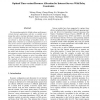Free Online Productivity Tools
i2Speak
i2Symbol
i2OCR
iTex2Img
iWeb2Print
iWeb2Shot
i2Type
iPdf2Split
iPdf2Merge
i2Bopomofo
i2Arabic
i2Style
i2Image
i2PDF
iLatex2Rtf
Sci2ools
121
click to vote
RTAS
2005
IEEE
2005
IEEE
Optimal Time-Variant Resource Allocation for Internet Servers with Delay
The increasing popularity of high-volume performancecritical Internet applications calls for a scalable server design that allows meeting individual response-time guarantees. Considering the fact that most Internet applications can tolerate a small percentage of deadline misses, we define delay constraint as a statistical guarantee so as to relax server resource requirements. A recent decay function model characterizes the relationship between the request delay constraint, deadline miss rate, and server capacity in a transfer function based filter system. This paper extends the model and develops a time-variant scheduling policy that minimizes system load variances and capacity requirement. The scheduler assumes no priori knowledge about the input request distribution and correlation structure. The resultant server capacity bound is further tightened by utilizing the information of request arrival distribution. Simulation results validate the extended decay function model and show t...
Related Content
| Added | 25 Jun 2010 |
| Updated | 25 Jun 2010 |
| Type | Conference |
| Year | 2005 |
| Where | RTAS |
| Authors | Xiliang Zhong, Cheng-Zhong Xu, Minghua Xu, Jianbin Wei |
Comments (0)

